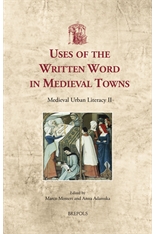Using the Written Word in Medieval Towns: Medieval Urban Literacy II, ed. Marco Mostert and Anna Adamska (Turnhout, 2014: USML 28), xx+453 pp. ISBN 978-2-503-54960-6.
In medieval towns, examples of personal writing appear more prevalent than in non-urban spaces. Certain urban milieus participating in written culture, however, have been the focus of more scholarship than others. Considering the variety among town dwellers, we may assume that literacy skills differed from one social group to another. This raises several questions: Did attitudes towards the written word result from an experience of the urban educational system? On which levels, and in which registers, did different groups of people have access to writing? The need and the usefulness of written texts may not have been the same for communities and for individuals. In this volume we will concentrate on the town dwellers’ personal documents. These documents include practical uses of writing by individuals for their own professional and religious ends, including testaments and correspondence. Besides written records belonging to the domain of ‘pragmatic literacy’, other kinds of texts were also produced in town. Was there any connection between practical literacy, literary (and historical) creativity and book production?
Contents
Marco Mostert and Anna Adamska, “Introduction”
Part I: Alphabets and Languages: Multi-Ethnic and Multilingual Urban Literacies
Andrzej Janeczek, “Urban Communes, Ethnic Communities, and Language Use in Late Medieval Red Ruthenian Towns”
Anti Selart, “Non-German Literacy in Medieval Livonia”
Anna Adamska, “‘Away with the Germans and Their Language!’: Linguistic Conflict and Urban Records in Early Fourteenth-Century Cracow”
Arnved Nedkvitne, “Linguistic Tensions between Germans and Natives in Scandinavia Compared to Eastern Europe”
Jakub Niedźwiedź, “Cyrillic and Latin Script in Late Medieval Vilnius”
Part II: Making Books and Telling Stories: Book Production and Urban Historiography
Eltjo Buringh, “The Role of Cities in Medieval Book Production: Quantitative Analyses”
J. Antoni Iglesias, “Books and Booksellers in the Cities of the Crown of Aragon: The Example of Barcelona”
Paweł Kras, “Libri suspecti, libri prohibiti: Wycliffite and Hussite Writings in Fifteenth-Century Towns”
Michele Campopiano, “The Problem of Origins in Early Communal Historiography: Pisa, Genoa and Milan Compared”
Iva Kurelac, “Writing about the Past of a Country from the Communal Viewpoint: Features, Models and Examples in Croatian Humanist Historiography”
Part III: Individuals Resorting to Writing: Business and Memoria
Mária Lupescu Makó, “Spoken and Written Words in Testaments: Orality and Literacy in Last Wills of Medieval Transylvanian Burghers”
Jakub Wysmułek, “Urban Testaments in Poland: Research Present and Future”
Hendrik Callewier, “Remembrance and Literacy: Memorial Practices of the Secular Clergy in Fifteenth-Century Bruges”
Karin Czaja, “The Nuremberg Familienbücher: Archives of Family Identity”
Part IV: Reading, Seeing, Hearing: The Place of Writing in the System of Urban Communication
Dušan Zupka, “Communication in a Town: Urban Rituals and Literacy in the Medieval Kingdom of Hungary”
Katell Lavéant, “Drama and Urban Literacy: Recording and Documenting the Performance in the Southern Low Countries (Fifteenth-Sixteenth Centuries)”
Andreas Zajic, “Texts on Public Display: Strategies of Visualising Epigraphic Writing in Late Medieval Austrian Towns”
Marco Mostert and Anna Adamska, “Whither Medieval Urban Literacy?”
Index


